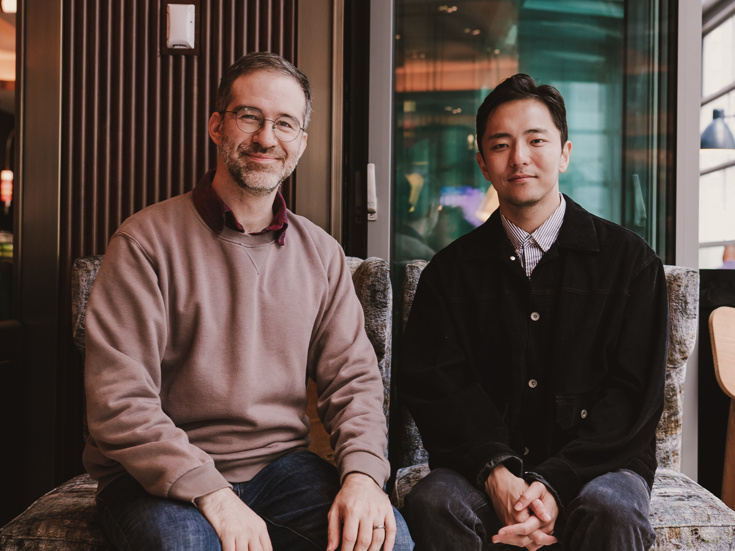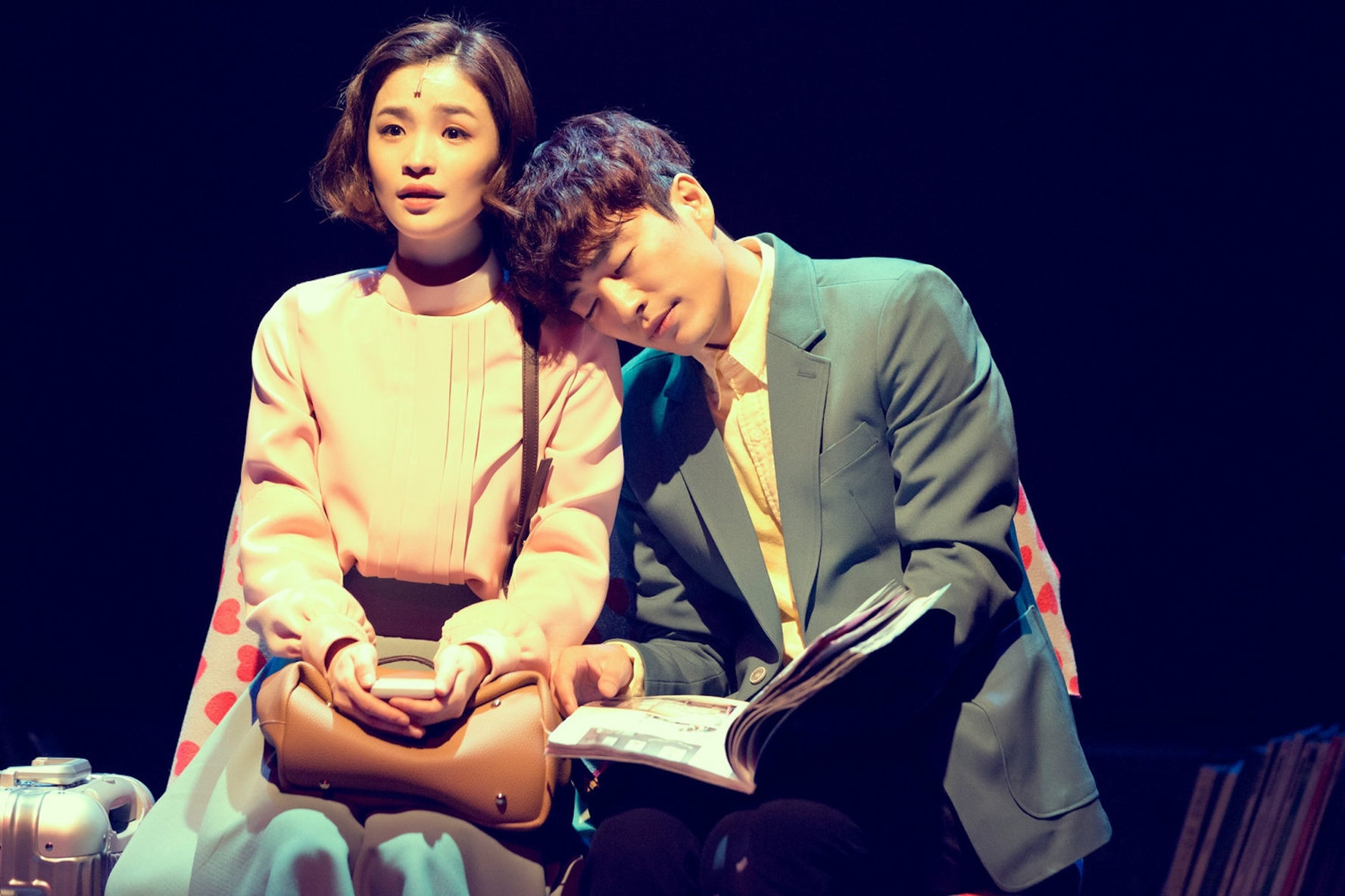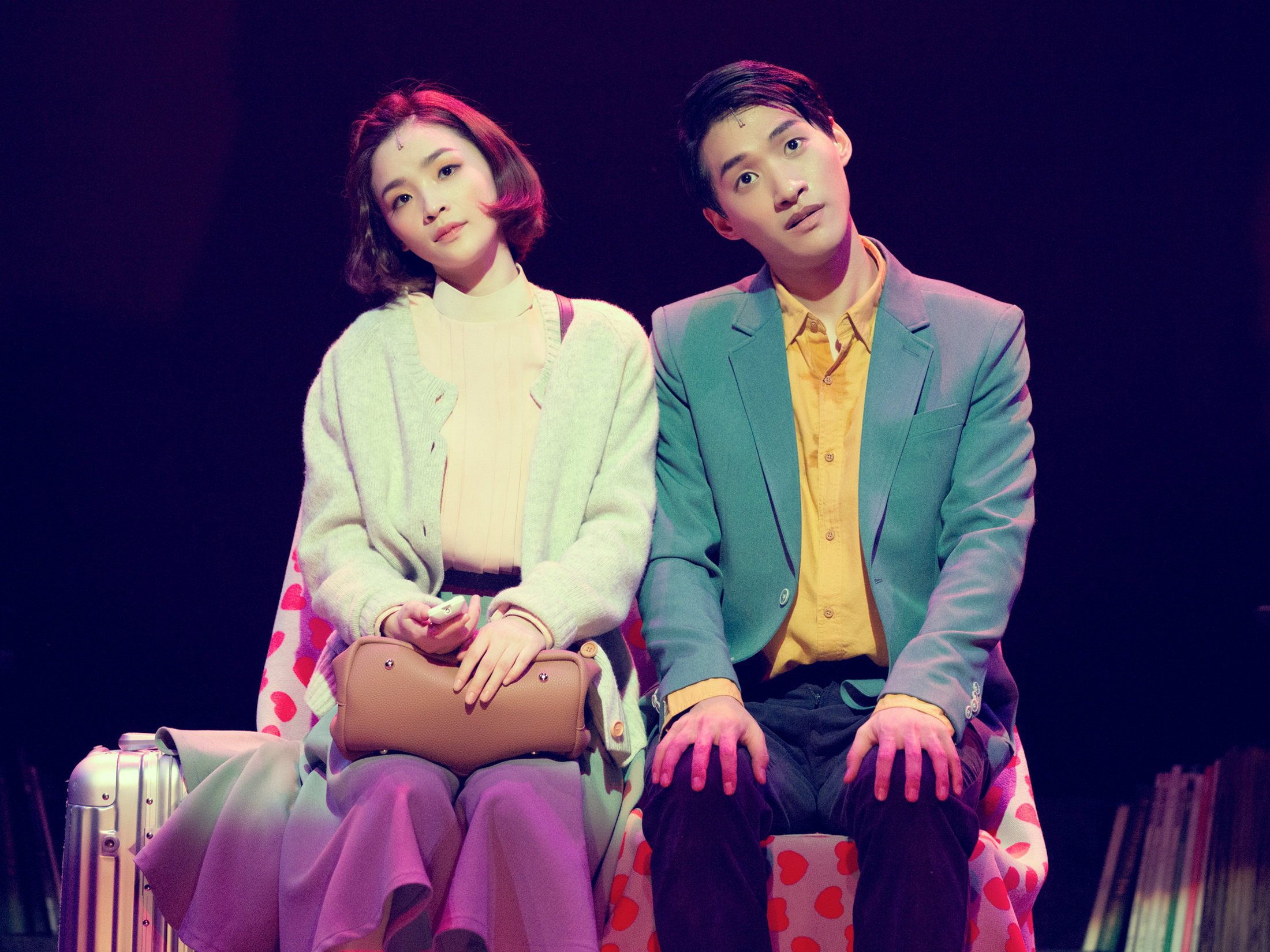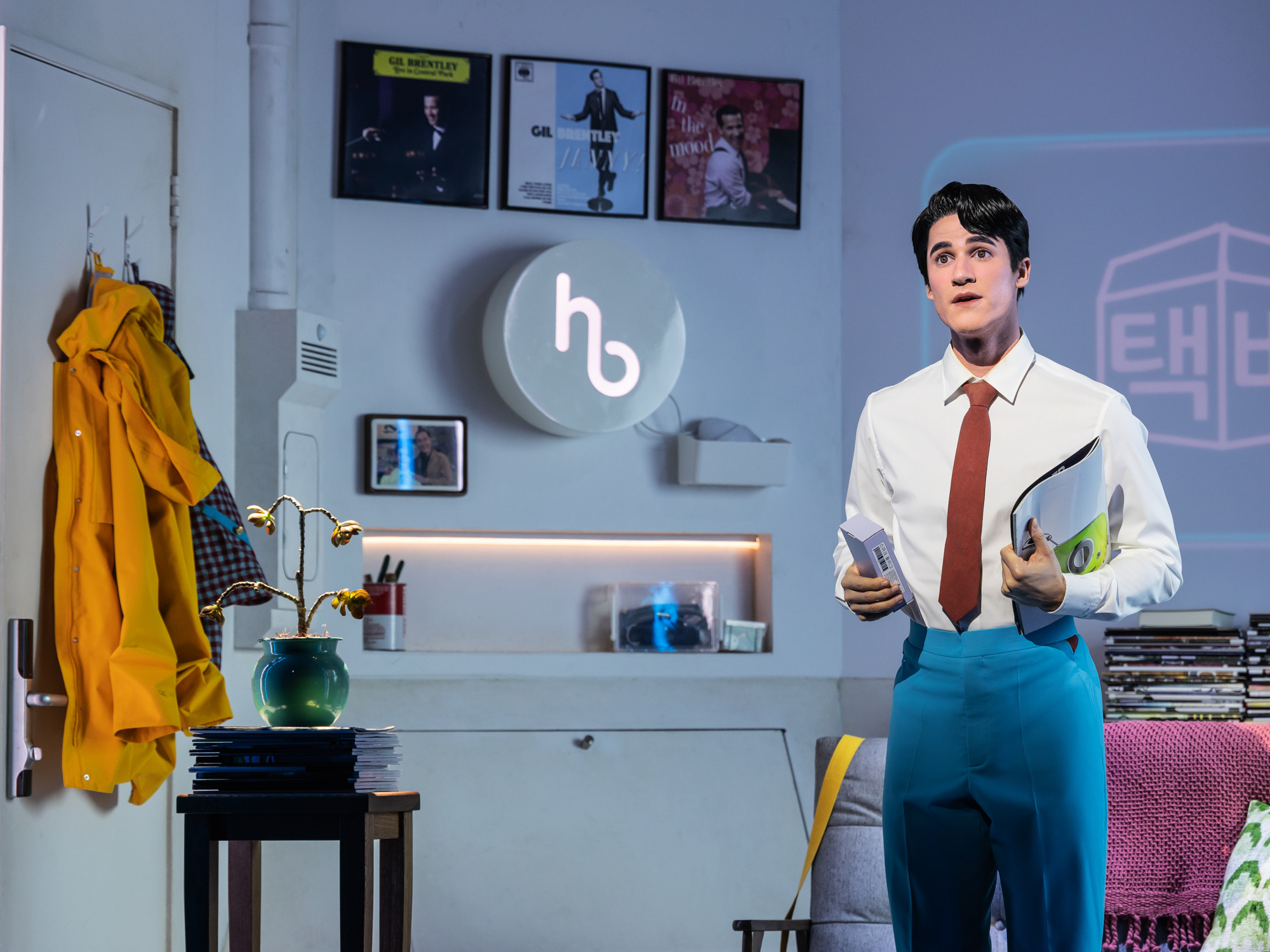A Kind of Love Story: How the Creators of the Sci-Fi Adventure Romcom Maybe Happy Ending Learned to Connect

(Photo: Michaelah Reynolds)
Partway through the new Broadway musical Maybe Happy Ending, the gloaming sky comes alight with the intermittent pinprick glow of a dozen or more fireflies and the musicians strike up a waltz. In between lightly plucked pizzicato notes, the strings tremble and quiver, rising and falling as if caught on the breeze. Our two heroes, a couple of wide-eyed robots, sing a wistful duet as they manage to catch a single twinkling firefly in a bottle.
This miniature pyrotechnic display is just one tender moment in a show filled with them. It also feels like an apt metaphor for a production which has gently reached out and managed to capture something magical and infinitely precious.
At first glance, the plot of Maybe Happy Ending might sound more like the stuff of anime than Broadway. Living in a brutalist apartment block outside Seoul in the 2060s, Oliver (Darren Criss, endearingly janky) is a Helperbot 3 who has inherited a love of jazz—that most human of art forms—from his erstwhile owner James. But Oliver’s safe, predictable life, entirely confined to a minimally furnished room, is disrupted by a knock at the door, and a Helperbot 5 (Helen J Shen, warm and winning) in need of some electricity.
What follows is a sci-fi adventure romantic comedy with themes reminiscent of at least three separate Pixar movies, along with moments that might remind theatergoers of Black Mirror, Eternal Sunshine of the Spotless Mind and A.I. Artificial Intelligence—all at the service of something that feels bracingly fresh.
The stripped-back score is rife with gorgeous, heartfelt melodies—Jon Brion, Ben Folds' sadder stuff and Penguin Cafe Orchestra come to mind—and also features, in a nod to Oliver’s cocktail-jazz tastes, a few numbers in the effortless crooning style of Nat King Cole and Chet Baker. The show is also visually spectacular, Dane Laffrey’s slick, high-tech set at various points suggesting panels in a manga comic, cinematic split screen and the smooth movements of apps on a smartphone.
Korean-American duo Hue Park (lyrics, book) and Will Aronson (music, book) started working on Maybe Happy Ending around a decade ago. The term they use to describe their overall vision: “epic intimacy.” “The show and the story and the music feels rather intimate,” said Park. “But, emotionally, we wanted it to be very grand.”
Maybe Happy Ending arrives on Broadway already a hit—albeit in South Korea.
Long before the musical’s U.S. premiere in Atlanta in 2020, the musical opened in a try-out production in Seoul in 2015. The show officially premiered there the following year, going on to win a raft of awards, including the 2019 Korean Musical Award for Musical of the Year. The show is wildly popular in the country; this summer, in Seoul, it enjoyed its fifth season. (There have also been runs in Japan and China.)

A musical about sentient robots might have an extra resonance in South Korea, which boasts the highest robot density in the world—one industrial robot for every 10 employees, according to the International Federation of Robotics. (This summer, the National Theater Company of Korea made headlines when it cast an "actual robot" in the lead role of a play. The show’s opening had to be postponed after said lead actor experienced technical difficulties.)
But despite the ostensible sci-fi trappings of Maybe Happy Ending—and some intriguing worldbuilding worthy of that genre—the show’s real concern, its creators insist, is what it is to be human. The actress Jeon Mi-do, who played Claire in the Seoul premiere, has said her portrayal was inspired by watching videos of babies.
“When I read the tagline, I thought, ‘That’s a terrible idea,’” Michael Arden, who directed the Atlanta premiere and directs the new Broadway production, told Encore. “By the time I finished reading and listening to the demo, I was a mess. I really felt it was about me and everyone I knew.”
“We’re not really talking about Helperbots,” said Park. “We're talking about humans and relationships.” The central question the show asks is, “When we in the future become more like robots emotionally, when we become more distant from each other, when we try to rely on technology to satisfy and distract ourselves—what is it going to be like to be a human being in that world?”
AS A YOUNG LYRICIST in Seoul, Park specialized in breakup songs. He was a firm believer in the importance of a lyrical concept and hook, in finding the right rhythm and language for the sentiment being expressed, and the art of telling a story within four or five minutes.
But after a couple of years—and even with a Top 20 hit to his name, “It's Okay to Cry”—he became disenchanted with K-pop. The whole business had become more and more depersonalized; songwriters weren’t even being credited for their contributions. “It didn’t feel like art to me,” he said. “I hated the feeling of not having any control over my work.”
Around 12 years ago, he moved to New York to pursue a visual arts degree at NYU. Through a mutual friend, he met Aronson.
"We’re not really talking about Helperbots. We're talking about humans and relationships." –Hue Park
At the time, Aronson had recently composed the score for a Korean-language musical, an adaptation of the twisted Korean romcom My Scary Girl. Aronson hadn’t known a word of Korean when he got the job; a Korean producer was simply looking for a “young—i.e. cheap—composer,” Aronson said. “That’s when I started collecting Korean-language textbooks, listening to language tapes on the subway, finding language exchange partners. I realized I had stumbled into an amazing opportunity and didn’t want to screw it up.”
At their initial meeting, Park and Aronson didn’t exactly hit it off. “We both thought each other kind of lame and not cool,” said Park. Aronson, also in the room, balked at the account. “I don’t remember that?”
In Park’s memory, Aronson professed a distaste for “sappy,” heart-on-its-sleeve pop. Park was taken aback. “I was like, oh, right. American people don't love anything emotional that way. You’re a loser if you do.”
“I wouldn’t have used that language,” Aronson said, gently.
Equally, in Aronson’s recollection of events, Park felt “a bit of suspicion” when it came to Aronson’s inherent fondness for musical theater. Park had no qualms about saying so when a lyric struck him as cheesy.
Even so, the pair had a few overlapping interests: Miranda July, for one. They were also both fans of the music of Ryuichi Sakomoto and Jon Brion. (In school, Park had started a Ryuichi Sakomoto fan club that boasted all of five members.) Despite their differences—or because their differences complemented one another's—Park and Aronson began to connect. Through Aronson, Park developed a deeper appreciation for the Great American Songbook; through Park, Aronson learned to stop worrying and love the pop.
“That was a huge effect that meeting Hue had on me, for the better. He just felt the whole point of music is to emote—to get to that place where you get a catharsis. That was a big turning point in my own writing.”

Together, they started writing and recording Korean-language songs—"breakup songs," Park said, grinning—for fun. Aronson composed the music, then Park would pen the lyrics. (Aronson has “thousands of tiny musical fragments” from those sessions, he said.) Then Aronson was approached with an offer to compose the score for another new Korean musical, an adaptation of the romantic reincarnation drama Bungee Jumping of Their Own. He invited Park to join the project.
At first, Park was resistant. His own exposure to the nascent art form of Korean-grown musical theater had not been altogether inspiring. Korean-language productions of western musical theater works, like The Phantom of the Opera, also left him cold. “I just felt like people were not trying to make musical theater songs sound as contemporary or as sophisticated as the Korean pop songs at the time. As a pop person, that was very weird to me. Why are they writing these lyrics in this very crude way? Why is no one trying to make musical songs sound like pop songs?” Then Park realized, well, maybe he could be the one to bring a refined pop sensibility to musical theater. Maybe he could help make Korean musical theater karaoke-worthy.
"He just felt the whole point of music is to emote...That was a big turning point in my own writing." –Will Aronson
Bungee Jump premiered in Korea in 2012 and won the award for Best Music/Lyrics at Korea’s Musical Awards. After completing that project, Park and Aronson returned to New York eager to start from scratch on an original musical. Park was in a reflective headspace. He had just gotten out of a “very serious, bad relationship” and a close friend had died from cancer. “I got the idea: I want to write a very honest, very intimate story about love and relationships and loss,” said Park.
Around that time, Park happened to hear the song “Everyday Robots” by Damon Albarn for the first time—a musical meditation on the social alienation of our overly tech-dependent age. Inspired by that track, Park’s idea took on a new dimension. It would still be a classic love story, boy meets girl. Except the boy and girl would be robots.
Aronson was instantly intrigued by the possibilities of two robot protagonists “living life with an intensity that a lot of us have forgotten,” he said. “Whereas we humans are sort of lost in our devices—everything sort of feels like a simulation—they're really experiencing it. Happiness feels more intense. Pain feels more intense. It was very exciting to dive into that.” The sci-fi framework allowed Aronson to unabashedly explore his emotional side. “It probably allowed me to be myself more.”
That openness of mind and spirit accounts for such honest, unfiltered expressions as “How to Be Not Alone,” Park and Aronson's butterfly wing-fragile ode to the first flowerings of something that might resemble love:
So here we are in some hotel
Trying to do what neither of us does well
We have to not be alone
I’m cringing less I’m laughing more
As I forget the stranger you were before
Then there's “When You’re In Love,” which has all the makings of an instant musical theater classic, its perpetually ascending melodic phrases exuding pure hopefulness.

Robot characters and sci-fi premise notwithstanding, the show taps into a timeless maxim about musical theater once espoused by Stephen Sondheim: “It’s not about being ‘smart.’ It’s about being alive.”
For a while there, Park admits, he got a bit carried away with the sci-fi adventure component—a mad, robot-poisoning scientist secretly in love with a robot was involved. Aronson gently brought Park back on course. “Will guided me: ‘No, it’s not about this adventurous sci-fi world. It’s actually about a very intimate relationship and loss.’ And I was like, yeah, that’s right. That’s the story I want to write.”
AFTER THE KOREAN TRY-OUT production in 2015 but before the official 2016 world premiere, Maybe Happy Ending received two industry readings in New York. About an hour after the second reading, Park and Aronson were out enjoying a drink when a call came through from their agent: Broadway producer Jeffrey Richards wanted to bring the show to Broadway.
“We didn’t really write this show thinking, oh, it’s going to open on Broadway,” said Park. “It was an experiment for us. We were still trying to figure out what we are doing as a team. But we were like, OK, I guess we should try it. And then here we are.”
The duo knows that Maybe Happy Ending's success in South Korea far from guarantees that the show will be a surefire hit on Broadway. For one thing, so far it is this season’s only entirely original new musical—no existing IP, no familiar musical catalog. But, said Aronson, “probably anyone who puts anything on Broadway is a mix of excited and terrified? Musicals are such odd, fragile things—even adaptations are kind of a miracle when they work.”
In any case, beyond Maybe Happy Ending, Park and Aronson’s collaboration shows no signs of running out of battery power. Il Tenore, their musical about Korea’s first operatic tenor during the Japanese occupation of the 1930s, premiered in Seoul in 2023, while Ghost Bakery, another romcom, this time with a supernatural twist, begins performances in the city in December. “It’s a bit overwhelming to have two new shows colliding like this,” said Aronson. “We’re trying our best to give our full attention to two beloved babies.” (Park also made his directorial debut in Seoul in September, directing the Korean premiere of Adam Rapp’s The Sound Inside.)
So far, all their musicals have been set in Korea. If there’s something else that characterizes their work, though, it might be a shared love of a far-out scenario (reincarnation, robots, ghosts, 1930s opera) combined with an excavation of deep emotional truths. “If the world is different enough to the actual world that you live in, you get to be more curious about the world,” said Park. “But the core elements, the story and the message is very universal and familiar. I think that's what we are trying to do here.”
Most of all, they love charting new territory together, where there’s a “willingness to push past the limits of what we thought possible,” said Aronson. In romcom terms, despite that inauspicious meet-not-so-cute, they complete each other.
“It's a mixture of my sensibility and Will’s sensibility,” said Park. “And I love that."


